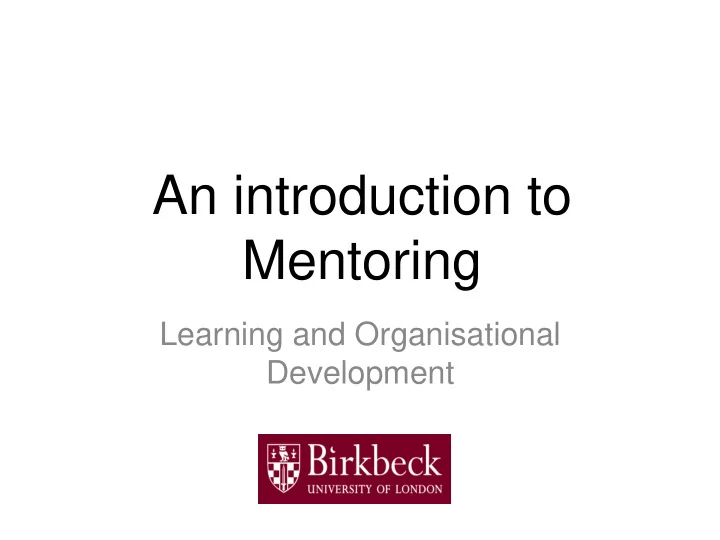

An introduction to Mentoring Learning and Organisational Development
This presentation… …is designed to provide you with useful information about Mentoring: • What it is • The benefits- to Mentors and Mentees • The Birkbeck Mentoring Scheme for Professional and Support staff • How to get involved
What is mentoring? Is it… Liaising with Telling a person Counselling? their line what to do? manager? Taking responsibility for Listening without their career advising? development? It’s actually none of these! Mentoring consists of the following elements…
Mentoring key elements… Guidance Giving advice Use of coaching skills Helping make contacts Sharing experience
Mentoring can be defined as… Mentoring is defined as a professional partnership in which an experienced person (the mentor) assists another (the mentee) in developing specific skills and knowledge that will enhance the less- experienced person’s professional, personal and career growth. The partnership will usually fall outside the line management structure of the mentee. Unlike coaching, mentors are permitted to offer advice and guidance, although its always the mentee’s choice whether to act on the advice, or not.
Mentoring is… It can help a A supportive person to form of manage their development career aspirations Mentees can Personal also discuss issues can issues be discussed related to if relevant their current role
What to expect from a mentoring conversation Mentoring can be described as an informal yet structured conversation, where a mentee can discuss with the mentor, issues that they would like to explore, relating to their career aspirations, current job role, or any other topic of relevance. The role of the mentor is to help the mentee gain clarity on actions that they would like to take to achieve their goals, helped by tapping in to the mentor’s experience, skills and knowledge.
Mentoring benefits… …to the Mentee • Being able to access a different form of personal development, than they may previously have experienced • The achievement of development outcomes which may include knowledge, technical and interpersonal skills • Better management of career goals • Developing a wider network of influence • Increased confidence and self awareness, which helps build performance and contribution
Mentoring… … benefits to mentors and organisations • Mentors gain benefits through sharing their knowledge and experience • Mentors also develop their skills of mentoring and coaching, through engagement with their mentees • Mentors gain considerable rewards through seeing their mentees develop and flourish • Organisations gain benefits through significant positive impact on recruitment and retention • Succession planning becomes more effective • Organisations become better able to adapt to change ( Research undertaken by David Clutterbuck)
There are ethical and confidentiality boundaries to protect mentees and mentors… 1. Confidentiality 2. Respect 3. Being clear for line about these manager relation- considerations ship and signing up to an agreement to maintain them
The Mentor’s role • Asks questions and challenges • Suggests networking opportunities • Boosts confidence and encourages • Offers advice • Helps set realistic goals • Acts as a sounding board • Can act as a “gateway” and facilitate contact with others • Passing on of knowledge – ‘How to…’
The role of the Mentee • Realistic expectations of the process- what can be achieved • Be open to challenge (self and another) – Assumptions – Beliefs – Fears • Ownership – The process – Actions arising
The Birkbeck Mentoring Scheme for Professional and Support Staff
Birkbeck Mentoring Scheme purpose • The Mentoring scheme for Professional and Support staff has been designed to complement other learning and development activities that are available to staff at Birkbeck. • The College is committed to developing an inclusive working and learning environment for its staff, and this programme complements other mentoring schemes already in place. • The purpose of the mentoring scheme is to provide an additional level of developmental support for a member of staff beyond that covered by the other mechanisms for training and development. • The scheme provides a formal platform whereby a mentor and mentee can create a confidential mentoring partnership aimed to assist the mentee to achieve personal and professional growth.
Birkbeck Mentoring Scheme objectives To support the development of Professional and Support staff To allow experienced staff to pass on To support learning from experience knowledge to others To help improve To provide an To provide guidance for cross-college alternative means of mentors and mentees development communication
Next steps Mentors have come forward and have taken part in a training programme Mentees are encouraged to apply to the scheme The Scheme will go live after the mentee training has taken place Mentors and mentees will be matched based on the areas requested by the mentee and the skills and experience of the mentor A Mentoring Agreement will be signed up to during the first mentoring meeting, so that both mentor and mentee are happy with the arrangements
Interested in finding out more? • We hope you have enjoyed this presentation and found it helpful. • Please contact Learning and Organisational Development, if you would like to learn more about the Mentoring Scheme.
Recommend
More recommend